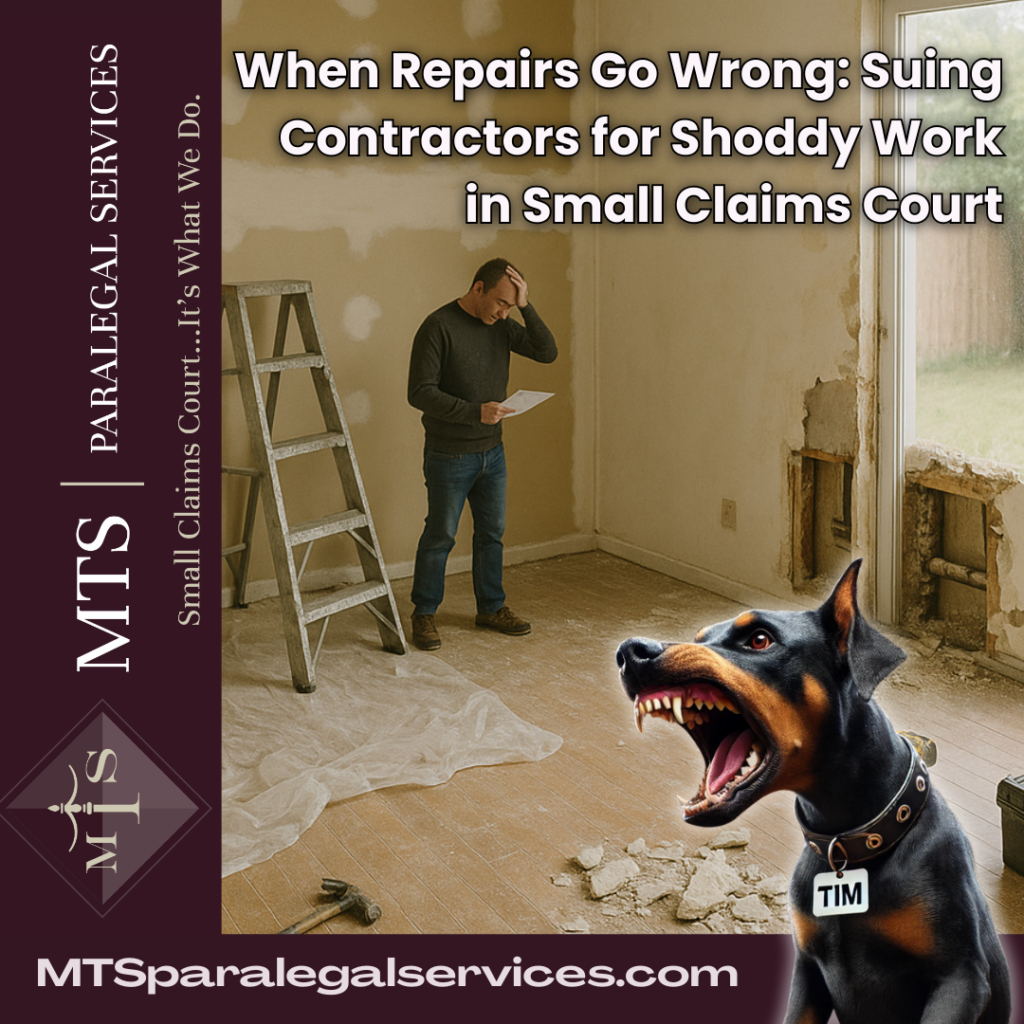
When Repairs Go Wrong: Suing Contractors for Shoddy Work in Small Claims Court
Hiring a contractor for home renovations or repairs comes with an expectation of professionalism, skill, and adherence to agreed-upon terms. Unfortunately, not all contractors deliver on their promises. From incomplete projects and inferior workmanship to outright negligence, homeowners are often left dealing with damages, financial losses, and frustration. When negotiations fail, suing contractors in Small Claims Court in Ontario may be the most effective path to justice.
Understanding Your Rights as a Consumer
Under the Consumer Protection Act, 2002 (CPA) and the Sale of Goods Act, Ontario residents are entitled to receive services that are completed with reasonable care and skill. A contractor who fails to perform to an acceptable standard may be in breach of contract or may have engaged in unfair practices. Whether the work was never finished, completed poorly, or caused additional damage, you may have legal grounds to pursue compensation through Small Claims Court.
Small Claims Court in Ontario handles civil disputes involving amounts up to $50,000, effective October 1, 2025. This increased limit makes it an even more accessible forum for homeowners seeking legal remedies for financial losses resulting from deficient or negligent contractor work.
Common Types of Contractor Disputes
Contractor-related claims in Small Claims Court typically involve:
- Incomplete or abandoned work
- Poor workmanship or use of substandard materials
- Overcharging or hidden fees
- Breach of contract or failure to follow written agreements
- Property damage caused by the contractor
If you have experienced any of the above, suing contractors in Small Claims Court may be a reasonable course of action.
Building a Strong Case
To increase the likelihood of success, thorough documentation is essential. Keep copies of written contracts, receipts, invoices, and any communications (emails, texts, letters) exchanged with the contractor. Photographs or videos showing the poor workmanship or damages can be compelling evidence. Expert reports or second opinions from certified professionals may also strengthen your position.
It’s also important to send a final demand letter before initiating a claim. This letter outlines your concerns, the damages suffered, and a formal request for compensation. If the contractor fails to respond or resolve the issue, it demonstrates a lack of willingness to cooperate, supporting your case in court.
Legal Representation Matters
While individuals can represent themselves in Small Claims Court, the rules of procedure and evidentiary standards can be complex. Errors in filing, insufficient documentation, or failing to articulate the legal basis for your claim can result in dismissal. Engaging a licensed paralegal with experience in contractor disputes is highly recommended.
Tim at MTS Paralegal Services has extensive experience representing clients in contractor-related matters in Small Claims Court. He understands both the legal framework and the practical strategies required to advance your claim effectively. Whether you’re pursuing damages or defending against a counterclaim, Tim offers reliable and affordable legal support throughout the process.
If you have suffered due to poor contractor workmanship or an unfinished renovation project, you have legal options. Suing contractors in Small Claims Court can hold them accountable and provide financial relief. Don’t navigate this complex legal terrain alone—call Tim at MTS Paralegal Services at (226) 444-4882 to discuss your situation and get the experienced support you need.
This content does not constitute legal advice. For up-to-date guidance or legal advice specific to your situation, please contact MTS Paralegal Services Professional Corporation or call (226) 444-4882.
